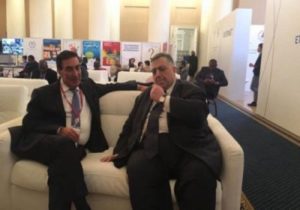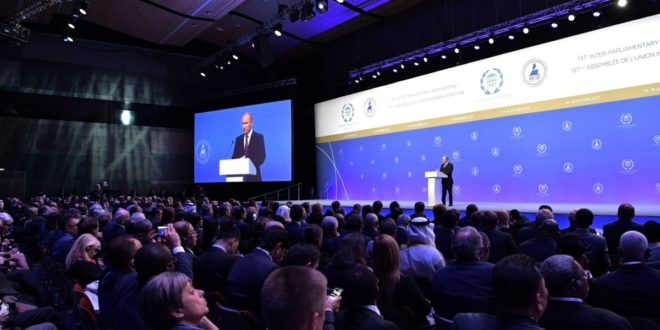Shehab Al Makahleh
In a rare qualitative step since the outbreak of the Syrian crisis, Jordanian Parliament Speaker Atif Al Tarawneh met with his Syrian counterpart Hamouda Al Sayegh in Saint Petersburg, where the 137th international parliamentary meeting is being held.

Commenting on the Syrian conflict, Al Tarawneh said: “The Syrian crisis and its repercussions have gone through three stages. The first stage is the conflict between the regime and the opposition. The second is the difference between the regime, the opposition and the forces of evil and terrorism. The third is the importance of intelligence exchange and the preparation of the intellectual war on terrorism”.
During a meeting with Syrian Parliament Speaker Wednesday evening, following a meeting of the working group formed by the Executive Committee of the Inter-Parliamentary Union to follow up the Syrian issue on the sidelines of the 137th Assembly of the Inter-Parliamentary Union in St. Petersburg, the Jordanian speaker said that Amman aspires to end the Syrian crisis in a manner that preserves its territorial integrity and achieves security and stability for its people, calling for peaceful solution and intra-Syrian dialogue to solve the crisis as “his Majesty King Abdullah II’s viewpoint about the Syrian conflict has proved correct when he called early on the outbreak of the Syrian crisis that the only solution is a political rather than military and that Syrians should talk to end their rift.”
For his part, the Speaker of the Syrian People’s Assembly appreciated the Jordanian position since the beginning of the crisis in his country and his support for dialogue and political solution in Syria. Al Sayegh stressed that “the fraternal ties that bind the two brotherly countries and their historical and social extension will improve their relations”.
The Jordanian speaker stressed that Jordan is keen on the return of the Syrian refugees to their country after the situation stabilizes and begins the process of reconstruction, where there are about 4 million Syrians in Jordan, Lebanon and Turkey.
A Jordanian parliamentarian, who declined to be named, said that Al Tarawneh told Al Sayegh that the speaker of the Jordanian Lower House of Parliament is ready to activate coordination at the legislative level between the two countries within the international parliamentary frameworks at the level of international and regional federations.
Since the outbreak of the Syrian conflict, Jordan has maintained diplomatic relations with Damascus, despite the tensions and mutual accusations that dominated relations between the two countries, culminating on May 26, 2014, when the two countries fired each other’s ambassador, after Jordan announced the announcement of the former Syrian ambassador in Amman General Bahjat Suleiman, an undesirable person, after repeated abusive statements.
Jordanian Syrian crossing point
In spite of the economic pressure on Jordan which forced its government to reopen the Jordanian Iraqi borders in September 2017, Jordan is now exercising more pressure on southern Syria fighters to hand over control of the two crossing borders with Syria (Ramtha- Dera’a and Naseeb-Jaber) to the Syrian government. Since 2011, Jordan has managed to inconspicuously maintain a relative veneer of security and stability along its 375km border with Syria.
Despite the tense diplomacy, the chairman of Jordan’s Joint Chiefs of Staff Mahmoud Freihat has earlier revealed that the channels of security communication with Syria did not stop during the years of crisis.
 Geostrategic Media Political Commentary, Analysis, Security, Defense
Geostrategic Media Political Commentary, Analysis, Security, Defense






You must be logged in to post a comment.